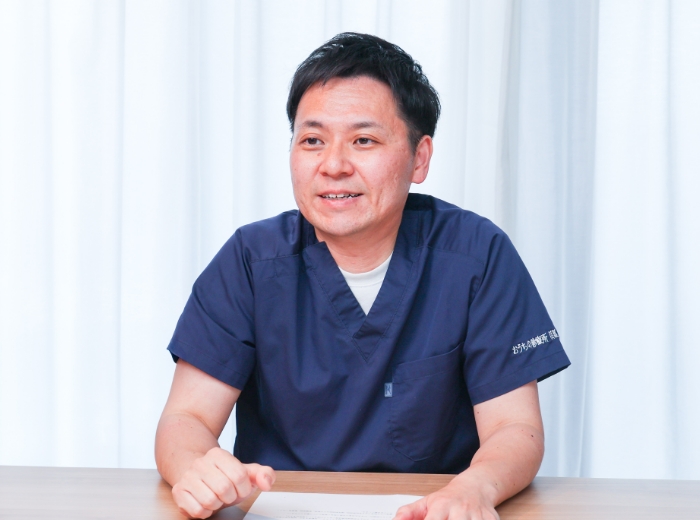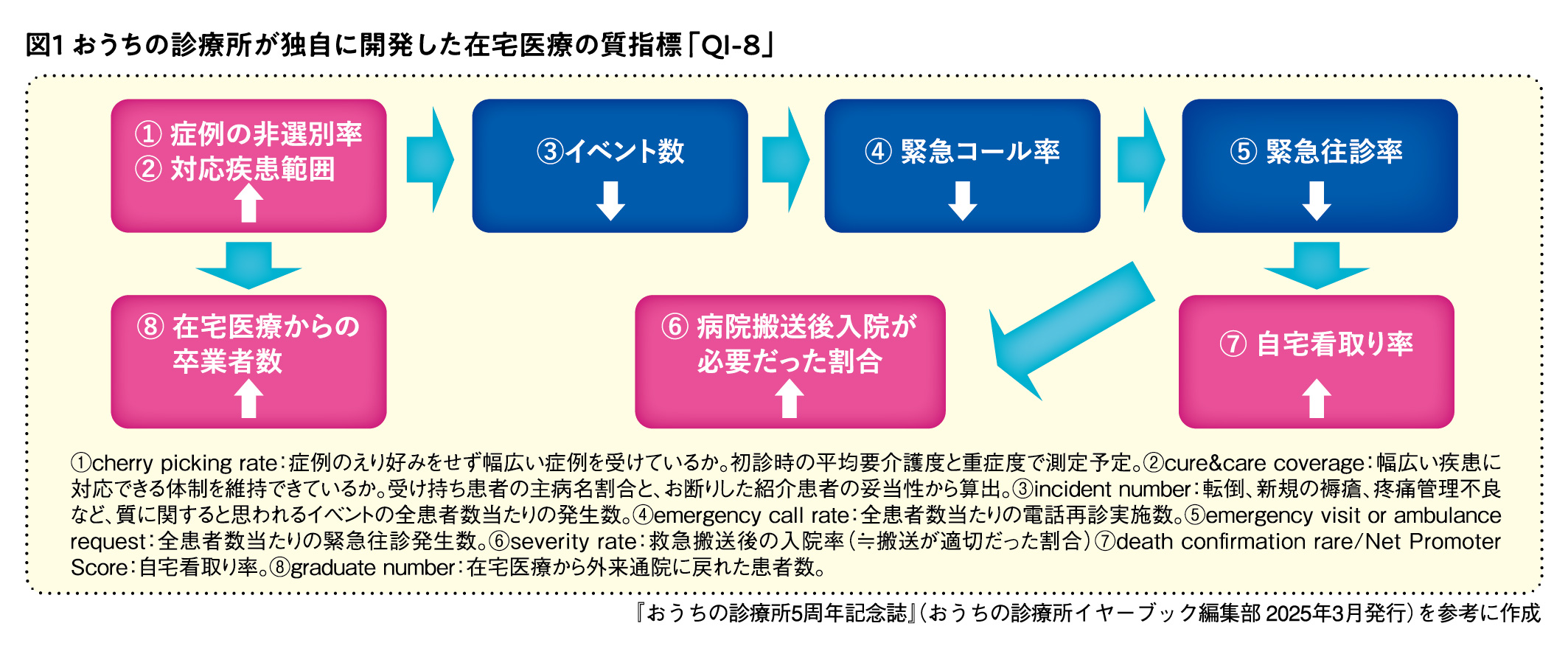ASOURCE®TIMES

医療法人社団 おうちの診療所
おうちの診療所 中野院長
石井 洋介
高知大学医学部卒業。16歳で潰瘍大腸炎と診断され、その後、大腸を全摘して人工肛門に。人工肛門を閉鎖する手術を執刀してくれた医師に憧れて消化器外科医の道に進む。横浜市立市民病院を経て厚生労働省に勤務。現在は医療法人社団おうちの診療所 おうちの診療所 中野院長、株式会社omniheal代表取締役、日本うんこ学会会長、高知大学デジタルヘルス学講座特任准教授、デジタルハリウッド大学大学院特任助教などを務める。
高齢社会の一つのメルクマールとなる2025年を迎え、在宅医療への需要が一層高まる中、質と量の両面においてその拡充が切望されています。厚生労働省医系技官として地域包括ケアシステムの仕組みづくりに携わった石井洋介氏は今、現場で「暮らしを支える」観点から在宅医療の実践に取り組んでいます。その活動を通して持続可能な医療保障制度、これからの在宅医療のあり方へのヒントを伺います。
コロナ禍が始まった2020年に「おうちの診療所 目黒」を開設し、現在は東京都目黒区と中野区に訪問診療を主とした機能強化型在宅療養支援診療所を構えています。私が在宅医療に取り組むようになったのは、厚生労働省で地域医療構想や地域包括ケアシステムの仕事に従事したことがきっかけでした。高齢者が増加し働く世代が減少する中、医療資源の再配置など国の政策を見直す仕事をするうちに、急性期病院で乗り切ってきた時代が大きく変わろうとしていることを肌身で感じたのです。そして、新しい医療のあり方として高齢者が最後まで家で暮らすことを支える在宅医療の充実が強く求められていることを実感しました。
しかし、在宅医療を担うプレイヤーの数が圧倒的に足りないうえに知見もまだまだ少なく、2025年問題が目前に迫るなか、国の政策誘導だけでは間に合わないと考え、現場での実践を通してボトムアップでこの課題に取り組むことを決意しました。
当院では、未来を見据えた先進的な取組みとして、診療の質を一定に保つことを重視した在宅医療の質指標「QI-8」(図1)を独自開発しました。診療の質を定量的に評価し、定期的に指標の推移を確認することで、患者さんに適切な医療を提供しているかどうかを振り返り、不足している部分があれば速やかに介入できるよう診療体制を整えています。
自分たちの診療の質を評価し、予防的ケアを実践した上で過剰介入を防ぐことは、患者さんの苦痛やスタッフの負担を軽減することにつながります。また限りある医療費の適正使用にも貢献します。患者さん・医療機関・国にとって‟三方よし”の仕組みを構築することが医療保障制度を持続可能なものにすると確信しています。
診療の質を保つうえで「関係の質」を高めることも大事にしています。MIT組織学習センター共同創始者のダニエル・キム氏が提唱する「成功の循環」モデルによると、周囲との関わり方やコミュニケーションなど「関係の質」が向上すると、おのずと考え方が前向きになり、目的意識が芽生え、「思考の質」が向上するとされています。その結果、積極性や主体性といった「行動の質」が向上し、「結果の質」が高まるので、「関係の質」がますます向上する好循環が生まれると考えられています。
患者さんの疾患だけでなく、人生や価値観を尊重し、利便性なども考慮しながら生活を支える在宅医療では、多職種の視点が診療の質に直結するため、当院ではこの考え方を取り入れています。日々の診療にそれぞれの職種の小さな気づきや、その職種ならではの視点や意見を反映することで患者さんの暮らしがより豊かになります。どの職種も意見を出し合える環境、つまり普段から「関係の質」を高め、スタッフ間で「心理的安全性の高い状態」を維持しておくことが欠かせません。
その工夫として、当院ではどの職種も対等な関係の組織づくりを推進してきました。全スタッフによる対話の場を作るために週1回、定期的にミーティングを開いています。さらに半年に一度、組織のビジョンや価値観について全スタッフで話し合う「関係の質DAY」を設けています。日常診療ではどうしても緊急性の高い会話が中心になるため、この日はコミュニケーションを優先した会話を意識するためにワークショップ形式で関係の質向上に励んでいます。
同時に患者さんの暮らしを豊かにするためには、スタッフ自身がワクワクしながら働くことも大切です。そのため、スタッフの柔軟かつ多様な働き方を尊重しています。例えば、週1回、普段の業務以外に自分の得意分野を生かせる業務に従事することで、働く意欲の向上を図っています。
コロナ禍感染者が急増した際には、入院が必要であるにも関わらず入院できない患者さんが続出しました。高齢社会の一つのメルクマールとなる2025年を迎えた今、高齢者医療においても同様の事態が起こることが予測され、在宅医療の重要性を再認識しています。その需要が高まる中、医療費削減の観点から医師の代替手段を開発することも喫緊の課題で、当院では診療看護師(NP:ナースプラクティショナー)や認定看護師などの活用にも積極的に取り組んでいます。
一方で、今後は急性期病院との連携を強化し、連携パスの標準化などを進めることで高齢患者さんのスムーズな在宅への移行を促し、本当に入院が必要な患者さんが適切な医療を受けられるようにすることも重要であると考えています。現在は、大都市圏で在宅医療を中心とした新しい高齢者医療モデルの構築を模索していますが、この経験と知見をもとに近い将来、人材をはじめさまざまなリソース不足に悩まされる地方においても同様のチャレンジをすることも視野に入れています。
これは世界に先んじて超高齢社会を迎える日本だからこそ可能な挑戦でもあります。地域の実情に応じてさまざまなバリエーションを持ったジャパンメイドの新しい高齢者医療モデルは、各国においてもきっと役立つことでしょう。このような大望も抱きながら「おうちの診療所」をベースにさまざまな実証実験を行い、「暮らしを支える医療」の知見を発信し続けたいと思っています。
